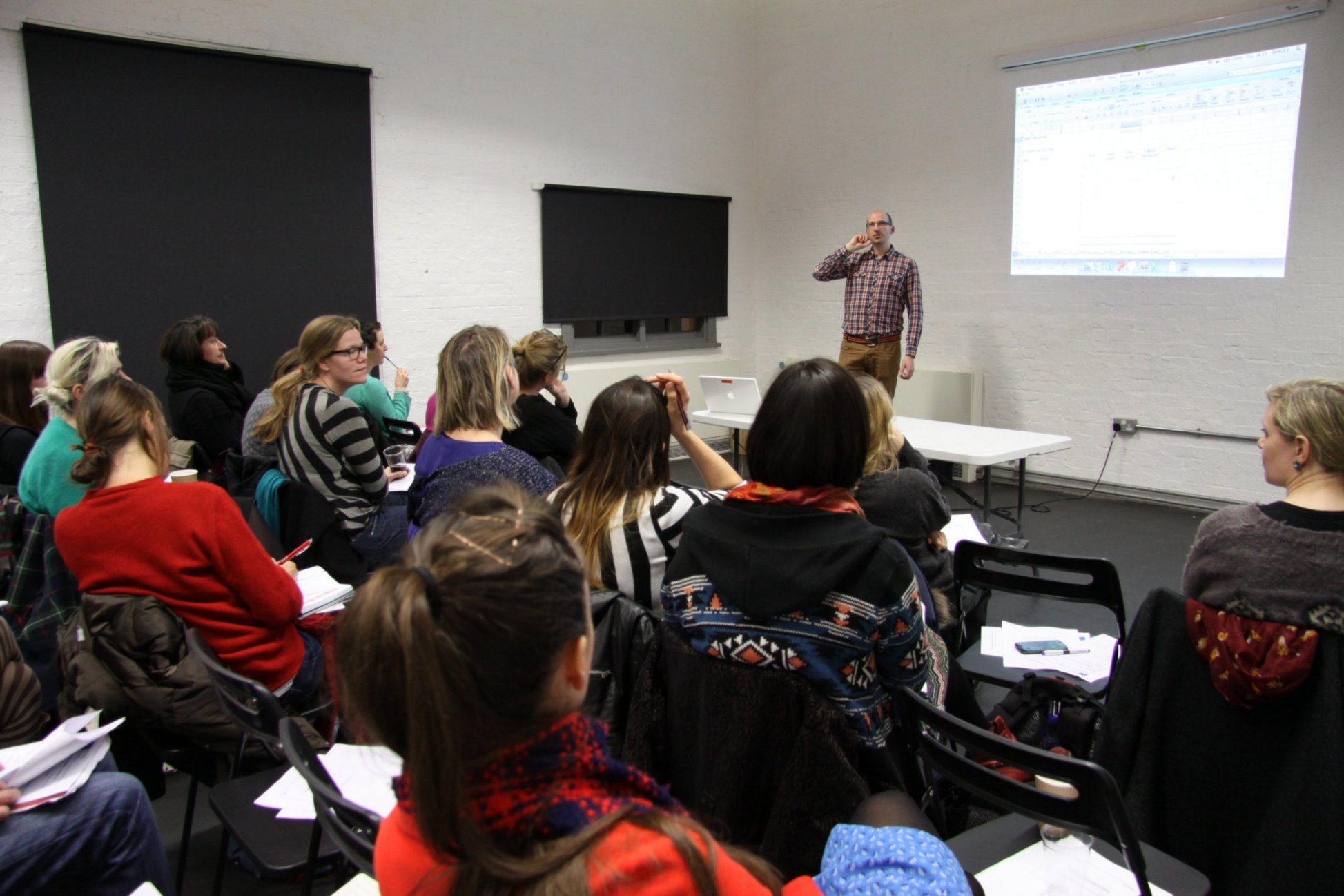
Artists at a tax workshop hosted by New Creative Markets
Partnerships put to the test
The European Regional Development Fund can be a crucial source of funding, but relations and processes between the partners involved need to be coherently managed, advises Florence Harmelin.
New Creative Markets is a support programme for the creative industries run by a consortium of four London arts organisations: Four Corners, Cockpit Arts, Photofusion and SPACE (the lead partner). Our goal is to assist small creative companies and freelancers in the photography, design, craft and visual arts sector to access new markets, by providing them with market knowledge and business skills. We were successful in accessing £1m from the European Regional Development Fund (ERDF) by proposing a project delivered to over 450 creative businesses in all parts of London. The four partners have developed and benefited from a close partnership since 2012 which will cease delivery in summer 2015. Anna Harding, Chief Executive of SPACE, explains the reasons behind the partnership: “Running an arts organisation with very limited core funding, my policy over the last nine years has been to work closely with partners whose expertise we value. We can extend our impact and reach and provide valuable benefits to more artists.”
Although the partners retained separate audiences and delivery, they agreed on a common client journey to map the progression of the participants throughout the programme. With a standardised vision and shared project documentation, the partners were able to offer a tailored programme, while retaining the coherence necessary to evidence the quarterly outputs required by the ERDF contract. The partners also benefited from networking, exchanging knowledge and being able to access each other’s consultant network, which increased the quality of delivery. Brand recognition for the programme was helped by cross-marketing between the partners and the use of a common logo and newsletter. The programme is already able to evidence a substantial impact on the London creative sector with over £600,000 of new sales created and £430,000 of increased economic performance.
However, working in partnership needs to be coherent, particularly in meeting the requirements of an ERDF contract. These requirements, which include forecasting and reporting, are onerous: New Creative Markets reports every quarter to the European Programmes Management Unit at the Greater London Authority. The more partners there are, the higher the number of risks that can affect the programme, for example, staff leaving, other sources of funding stopping or a partner’s strategy evolving. Managing such change is an important part of the continued success of similar programmes.
The requirements of an ERDF-funded programme can be demanding for small independent organisations, both in spending the budget and in providing evidence of the outputs. The project is only 50% funded by Europe, which means that 50% match-funding needs to be secured for the duration of the programme – and that cannot be ‘in kind’ funding. Therefore cash flow must be managed effectively to safeguard jobs in the delivery partner organisations. All eligible costs that are to be claimed for elements of delivery, such as venues, consultants and speakers, need to be procured in line with EU regulations, which staff may not be familiar with.
Evidencing outputs requires a detailed evidence trail and considerable administrative staff time. It is crucial that the aims of each partner are in alignment with the aims of the programme for the experience to be worthwhile.
The new round of ERDF and European Social Fund funding will be announced in the New Year. Meeting the requirements can be demanding for smaller organisations, but such funding can provide a notable source of revenue for cultural organisations in a time of cuts and reductions in national grants. Some key lessons that we have learnt are the following:
- Work with partners who share the same culture and who you can communicate with easily. Meet regularly to review performance, share issues and discuss solutions and experiences.
- Have service level agreements in place that are transparent and which detail each partner’s responsibility, contribution to the programme and early exit strategies.
- Invest in a dedicated programme manager to co-ordinate the partnership, be responsible for all reporting, manage the relationship with the funders and lead on exit strategy and programme dissemination.
- Adopt from the start common management and administrative systems and processes to maximise budget spend, manage cash flow and performance, and evidence outputs in keeping with funders’ requirements.
- Use the programme to inform and develop each partner organisation’s strategy, as it can provide invaluable data for your track record and can lead to future partnership collaboration.
- Use the experience and reach of the programme to develop your organisation’s network, services and ultimately your sustainability.
Florence Harmelin is ERDF Programme Manager at New Creative Markets.
www.spacestudios.org.uk/artist-cats/ncm/
Join the Discussion
You must be logged in to post a comment.